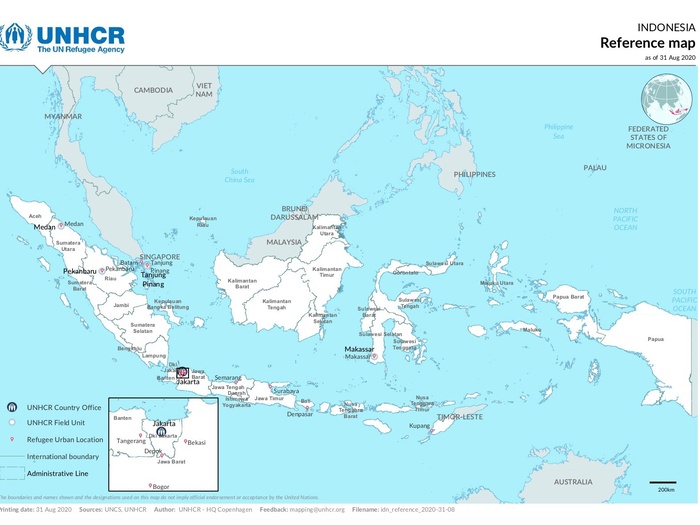UNHCR in Indonesia
UNHCR in Indonesia

In late 2016 the President of the Republic of Indonesia signed the Presidential Regulation on the Handling of Refugees, which contains key definitions and sets out processes for the detection, shelter and safeguarding of refugees and asylum-seekers.
It is anticipated that provisions contained within the Presidential Regulation will be implemented in the near future and that it will bring about closer working relationships between the Indonesian Government and UNHCR, including joint registration of asylum-seekers.
Surrounded by countries hosting large numbers of asylum-seekers and refugees, such as Malaysia, Thailand and Australia, Indonesia is impacted regularly by mixed population movements. After a lull during the late 1990s, the number of asylum-seekers arriving to Indonesia began to increase in late 2000, 2001 and 2002. Arrivals slowed down from 2003 to 2008, but again picked up in 2009.
In 2015 onwards until 2020, new arrivals declined again. By September 2025, the cumulative number of refugees registered in Indonesia was 11,900 persons from 54 countries, with majority of of the population are Afghan refugees (41%).
UNHCR’s protection activities begin with ensuring that refugees and asylum-seekers are protected from refoulement – in other words, from forced return to a country or territory where their lives or freedom might be in danger. UNHCR then undertakes a process of verification of identity for the purpose of registration and issuance of individual documentation.
Registered asylum-seekers will then be scheduled to have their claims for refugee status thoroughly assessed by UNHCR in what is known as a Refugee Status Determination (RSD) Procedure. This procedure offers each individual asylum-seeker an opportunity to be interviewed in his/her own language by an RSD officer assisted by a qualified interpreter, who will assess the merits of the individual's claim for international protection.
The asylum-seeker will be then provided with a reasoned decision on whether they qualify for refugee status under UNHCR's mandate. In case one’s claim for protection is initially rejected, the RSD procedure grants the asylum-seeker an opportunity to appeal the negative decision.
For those found to be refugees, UNHCR will begin to look for one of a range of what UNHCR calls comprehensive solutions. Traditionally, these solutions have included resettlement to a third country, voluntary repatriation (if a person is able to return in safety and dignity), and local integration in the country of asylum.
However, in the current global refugee crisis, with at least 117.3 million persons displaced around the world, UNHCR is working to identify a range of other solutions, including: temporary stay measures that allow refugees access to self-reliance opportunities until a longer-term solution can be found; complementary pathways, such as university scholarships, labor migration schemes, and state-facilitated family reunification.
Finding an appropriate longer-term solution for each refugee is a complex and often lengthy process that involves considering the particular circumstances of the individual or family and identifying solutions that match their particular needs.
Where We Work
Text and media
UNHCR Indonesia’s main office is located in Jakarta, while the agency has presence in Aceh, Medan, Pekanbaru, and Makassar to assist the Government in addressing the needs of refugees and asylum-seekers.
Together with the authorities and other partners, UNHCR carries out its protection and assistance work across the country where refugees and asylum-seekers live.


